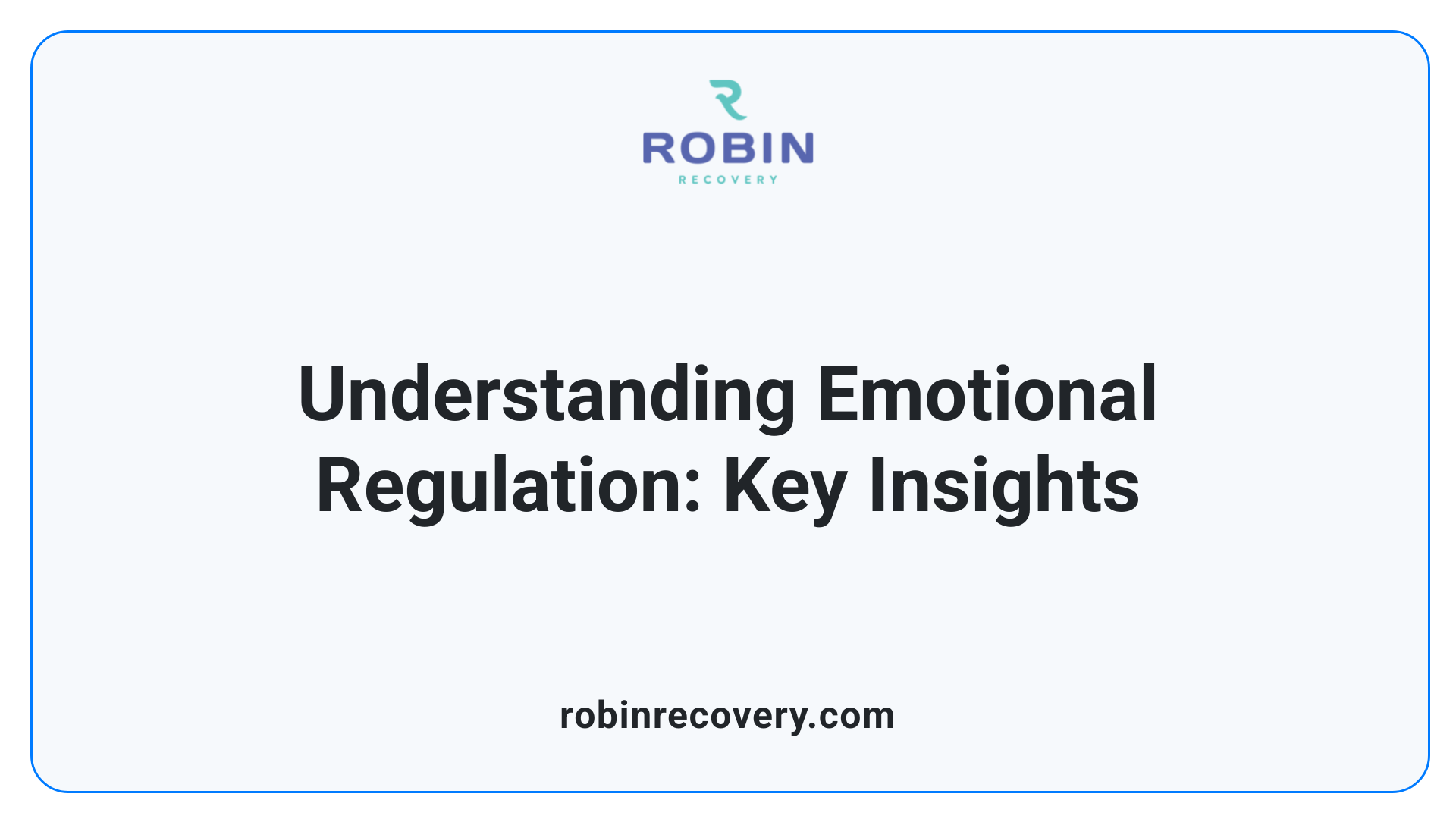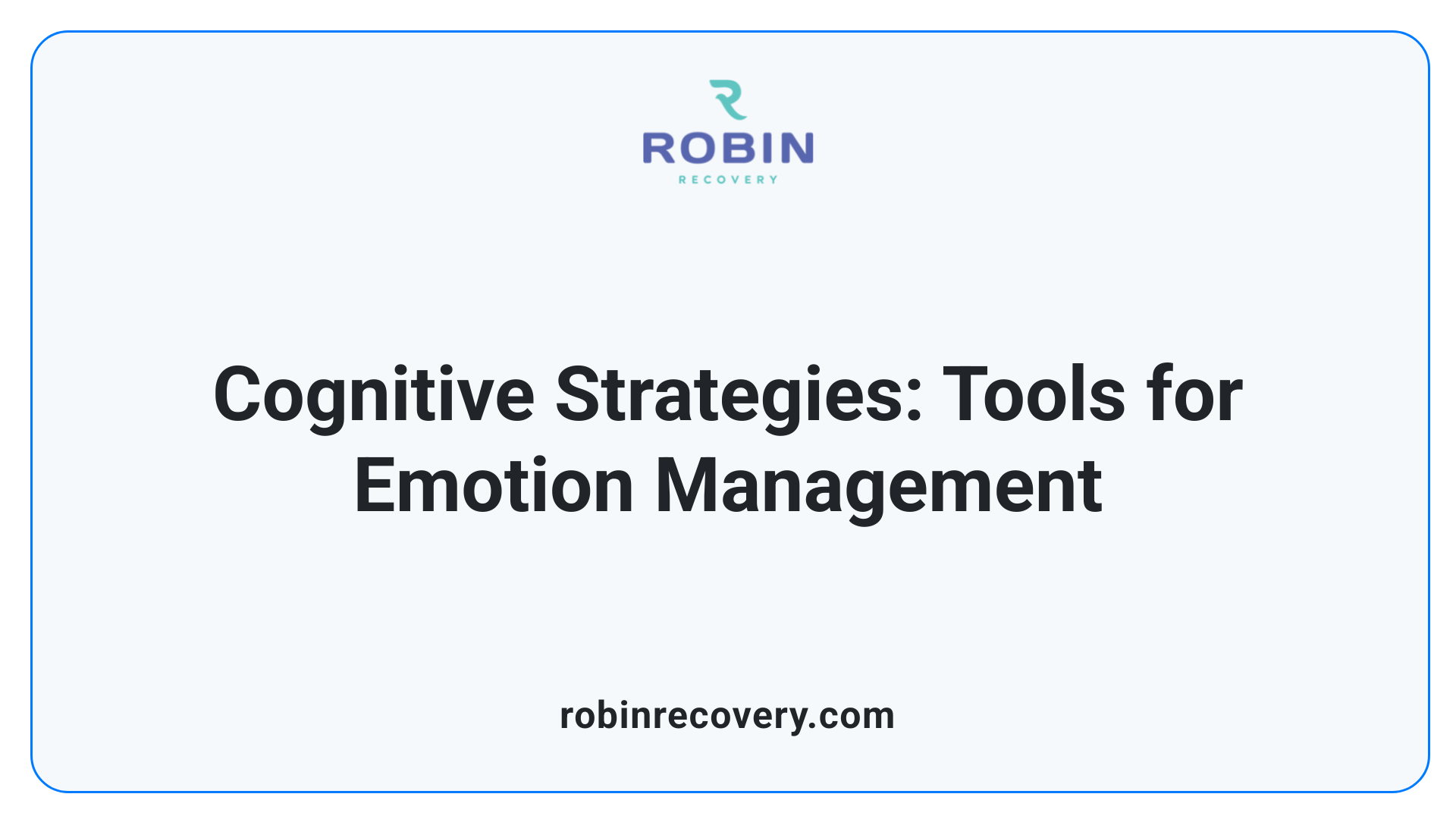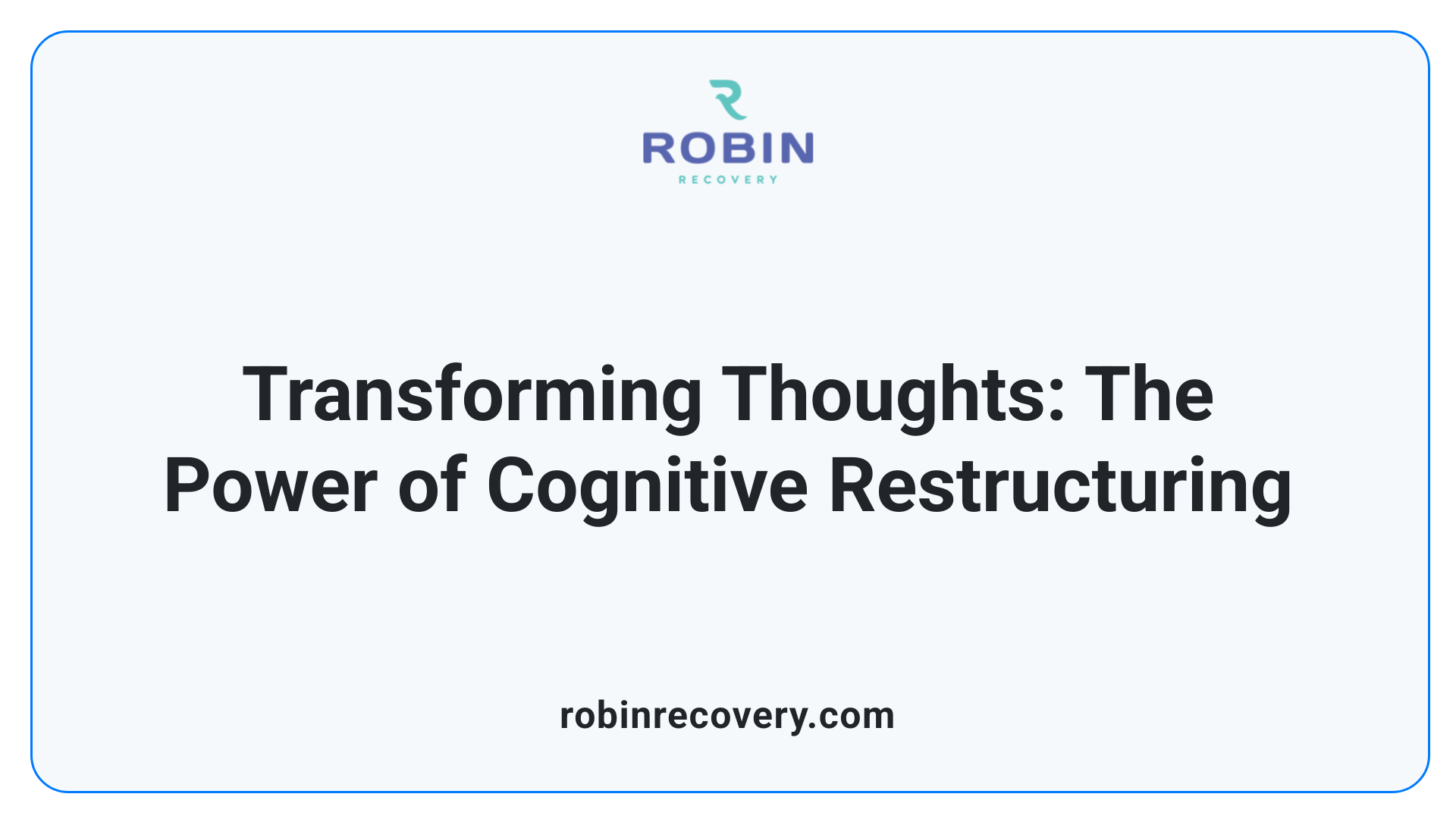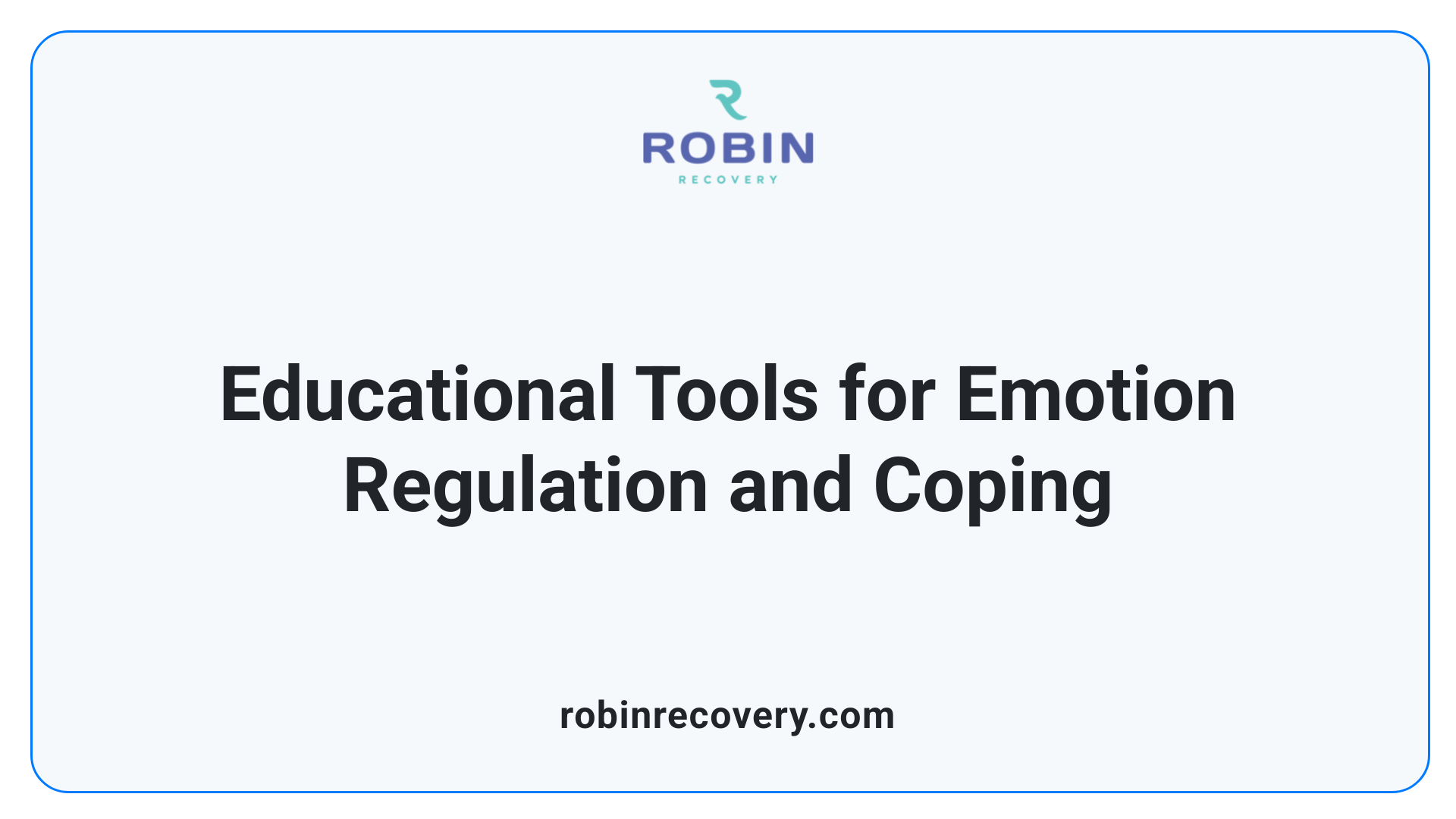How CBT Techniques Improve Emotional Regulation

Understanding Emotional Regulation and CBT
Emotional regulation is a critical aspect of psychological well-being, encompassing the ability to manage and respond to emotional experiences in adaptive ways. Maintaining emotional balance allows individuals to navigate life's challenges effectively, thereby promoting mental health and social success. Cognitive-Behavioral Therapy (CBT) is renowned for its efficacy in improving emotional regulation by transforming negative thought patterns, ultimately altering emotional responses. This article delves into the mechanisms through which CBT enhances emotional mastery, exploring both theoretical insights and practical techniques.
The Concept of Emotional Regulation

Definition of emotional regulation
Emotional regulation refers to the processes individuals use to manage and modify their emotional responses. This involves understanding feelings, labeling them accurately, and consciously choosing how to respond to them. By effectively regulating emotions, individuals can navigate challenges with greater balance and resilience.
Importance for mental health
The ability to regulate emotions is crucial for mental well-being and social success. Poor emotional regulation can lead to psychological distress, making it difficult to handle stressors or engage in healthy interpersonal relationships. Techniques such as cognitive restructuring within CBT help individuals shift negative thought patterns, ultimately enhancing their emotional and psychological health.
Components of emotional regulation
Effective emotional regulation comprises four main components:
- Subjective Feelings: The personal experiences of emotions.
- Cognitive Appraisal: How individuals interpret and evaluate emotional situations.
- Physiological Responses: The bodily reactions associated with emotions, like increased heart rate or muscle tension.
- Action Tendencies: The behavioral impulses that arise, which can either promote or hinder adaptive responses.
These components interact to shape an individual's emotional experience and response, making understanding and improving emotional regulation vital for achieving emotional stability.
CBT Techniques for Adults: Enhancing Emotional Stability

How do CBT techniques improve emotional regulation in adults?
CBT techniques improve emotional regulation in adults by fostering the ability to identify and challenge unhelpful thoughts, which in turn alters emotional responses.
- Cognitive Reappraisal: This technique allows individuals to change their perspective on situations. By reframing negative or distressing thoughts, individuals can effectively reduce negative emotions.
- Mindfulness Practices: These exercises help individuals become more aware of their emotions. Mindfulness encourages acceptance of emotional experiences, which leads to reduced reactivity and enhanced control over emotional responses.
- Distress Tolerance and Coping Skills: Skills such as distress tolerance equip individuals to cope with intense emotions without reverting to unhealthy behaviors. CBT teaches methods for accepting uncomfortable feelings, thus empowering individuals to manage strong emotional states constructively.
Overall, CBT provides practical strategies for managing emotions, which is essential for maintaining psychological health and well-being.
Overview of CBT Techniques
Technique Description Benefits Cognitive Reappraisal Changing the emotional meaning of situations Reduces negative feelings Mindfulness Practices Focusing awareness on the present moment Improves emotional acceptance and regulation Distress Tolerance Accepting and coping with distressing emotions Reduces reliance on avoidance behavior
Practicing these techniques enables adults to develop healthier relationships with their emotions, fostering greater emotional stability.
Cognitive Strategies and Reappraisal Techniques

What are cognitive strategies for emotion regulation?
Cognitive strategies for emotion regulation encompass various techniques that individuals employ to manage their emotional responses to negative situations. Research identifies nine cognitive emotion regulation strategies:
- Self-blame
- Rumination
- Catastrophizing
- Other-blame
- Acceptance
- Positive refocusing
- Refocus on planning
- Putting into perspective
- Positive reappraisal
Among these, the first four are categorized as maladaptive, often leading to worsening emotional states, while the remaining five are classified as adaptive, promoting healthier emotional responses. For instance, self-blame and rumination are linked to anxiety and depression, whereas strategies such as acceptance and positive reappraisal can lessen distress.
How does positive reappraisal work?
Positive reappraisal is a technique that actively alters the emotional meaning attributed to a situation. By viewing challenging experiences in a more positive light, individuals can reduce negative feelings and enhance their emotional well-being. Neuroscientific research highlights that employing this strategy activates brain areas associated with emotional regulation, which helps diminish the activation of the amygdala, the region linked to fear and anxiety.
Promoting Adaptive Strategies
The focus on promoting adaptive strategies, like positive reappraisal, is essential not only in clinical settings but also in educational practices. Teaching these techniques can lead to improved emotional regulation and overall mental health outcomes, particularly for those facing anxiety and depression. Encouraging the use of these effective strategies can facilitate healthier emotional experiences and responses.
Cognitive Restructuring: Transforming Thought Patterns

What is cognitive restructuring for emotional regulation?
Cognitive restructuring is a fundamental technique in cognitive-behavioral therapy (CBT) that helps individuals identify and modify distorted thinking patterns contributing to emotional distress. This technique guides users through a structured process of recognizing negative or irrational thoughts and replacing them with more balanced and realistic perspectives.
By altering these thought patterns, individuals can significantly reduce the intensity of their emotional responses. For instance, someone struggling with anxiety or depression might learn to reframe catastrophic thoughts into more rational evaluations of their situations.
This practice not only reduces negative affect—such as feelings of hopelessness or fear—but also fosters healthier emotional responses. With effective cognitive restructuring, people can approach challenges more adaptively, enhancing their ability to manage their emotions.
Impact on emotional regulation
Implementing cognitive restructuring leads to substantial improvements in emotional regulation. It shifts how individuals interpret and respond to their emotions, helping them develop a more stable emotional state.
This process is particularly beneficial in reducing maladaptive behaviors, like avoidance or excessive rumination, which can escalate emotional distress. Cognitive restructuring also empowers individuals to face stressful situations with increased resilience and clarity.
Overall, by focusing on transforming negative thoughts, cognitive restructuring plays a critical role in enhancing emotional well-being and fostering a healthier psychological environment.
CBT Techniques for Children: Building Emotional Skills
What are specific CBT techniques for emotional regulation in children?
Cognitive-behavioral therapy (CBT) offers a range of effective techniques designed to improve emotional regulation in children. These techniques are aimed at helping young individuals understand, express, and manage their emotions more effectively.
One prominent program is the SNAP program, which focuses on enhancing emotion regulation skills for children aged 6 to 11, particularly those exhibiting high levels of conduct problems. Research shows that children in this program experienced significant reductions in irritability. This supports the idea that enhancing emotional regulation is key to managing symptoms related to behavioral and emotional challenges.
Techniques for emotional regulation in children
The following table summarizes some specific CBT techniques tailored for children:
Technique Description Benefits Identifying and quantifying emotions Children learn to recognize and articulate their feelings clearly. Fosters emotional awareness and validation. Deep breathing This technique involves teaching children to use their breath to manage anxiety and stress. Helps reduce physiological symptoms of distress. Progressive muscle relaxation Children learn to tense and relax muscle groups to alleviate tension associated with emotions. Encourages relaxation and emotional calmness. Child-centered homework Engaging in activities that allow for practice in identifying emotions and using coping strategies. Reinforces learned skills in real-life contexts. Visualization of coping strategies Children visualize calming scenarios or successful responses to difficult emotions. Enhances preparedness and coping mechanisms.
These techniques emphasize an interactive approach where caregivers play a critical role. Collaborative discussions allow children to label their emotions, fostering a deeper understanding and encouraging open communication about feelings. As children gain these skills, they become empowered to deal with their emotions effectively and manage stressful situations with newfound confidence.
Theoretical Underpinnings and Practical Implications of CBT
Relationship between CBT and emotional regulation
Cognitive Behavioral Therapy (CBT) plays a vital role in enhancing emotional regulation (ER) by tackling unhelpful thought and behavior patterns that exacerbate negative emotions. Through CBT, individuals are trained to identify cognitive distortions—such as all-or-nothing thinking or catastrophizing—and replace them with more constructive thoughts. By reframing these thoughts, emotional responses can shift positively, enabling a more adaptive coping mechanism.
CBT emphasizes the interplay between thoughts, feelings, and behaviors, forming a loop that when modified in one area can lead to beneficial changes in others. This structured approach allows clients to recognize how their internal narratives affect their emotional stability, paving the way for healthier emotional experiences.
Interaction of neural mechanisms involved
The neuroscience behind CBT highlights the interaction between areas like the amygdala and prefrontal cortex, both critical in regulating emotional impulses. The amygdala is responsible for processing emotional responses, while the prefrontal cortex helps in the conscious management of these emotions. This dynamic interaction is particularly relevant in CBT, where techniques such as cognitive reappraisal and mindfulness aim to reinforce prefrontal cortex activity, allowing for better emotional control.
Ultimately, the integration of CBT principles and an understanding of neural mechanisms can enhance therapeutic effectiveness, not just in improving emotional regulation but also in addressing a spectrum of psychological disorders. By engaging in these evidence-based practices, individuals gain valuable skills to manage their emotional responses, contributing to overall well-being.
Mindfulness and Awareness in CBT
Mindfulness Practices and Their Role in CBT
Mindfulness is a fundamental component of Cognitive Behavioral Therapy (CBT) that focuses on enhancing awareness of thoughts and emotions in the present moment. By promoting a non-judgmental approach to experiences, mindfulness allows individuals to observe their thoughts and feelings without becoming overwhelmed by them. Techniques such as deep breathing, progressive muscle relaxation, and mindfulness meditation encourage individuals to step back from their emotional responses. This observation fosters emotional clarity and helps in managing stress more effectively.
Benefits for Emotional Regulation
The integration of mindfulness within CBT has shown significant benefits for emotional regulation. Practicing mindfulness helps individuals recognize their emotions before they escalate, allowing for early intervention and the use of coping strategies. Studies indicate that individuals trained in mindfulness experience less emotional distress, greater resilience, and improved well-being. Additionally, mindfulness techniques encourage acceptance of emotions, making it easier to engage in cognitive restructuring and tackle negative thought patterns. These elements create a balanced approach to emotional experiences, ultimately enhancing mental health outcomes and promoting emotional stability.
Empirical Evidence Supporting CBT's Effectiveness
Research Findings
Empirical studies have consistently demonstrated the effectiveness of Cognitive Behavioral Therapy (CBT) in enhancing emotional regulation. Numerous randomized controlled trials (RCTs) have shown that CBT significantly improves emotional functioning by addressing the interconnection between thoughts, feelings, and behaviors. For instance, one study highlighted how engaged CBT techniques, such as cognitive restructuring and problem-solving skills, play a pivotal role in altering dysfunctional thought patterns, which subsequently leads to improved emotional responses.
Furthermore, CBT's focus on emotion regulation mechanisms has been validated through laboratory-based research, shedding light on how these approaches actively work to mitigate emotional dysregulation. Techniques like mindfulness, cognitive reappraisal, and labeling have been shown to decrease emotional reactivity, particularly in stressed populations.
Success in Treating Mental Health Conditions
CBT has proven particularly effective for various mental health conditions, including anxiety disorders, mood disorders, and emotional dysregulation. Studies have illustrated that individuals undergoing CBT report substantial reductions in symptoms of depression and anxiety, as well as enhanced overall emotional health. For example, the SNAP program for children demonstrated significant improvements in irritability, connecting emotion regulation training directly with better behavioral outcomes.
These findings underscore the importance of targeting emotional regulation within therapeutic interventions, as enhancing these skills plays a crucial role in achieving optimal treatment outcomes across diverse patient populations.
Educational Resources for CBT and Emotional Coping

What educational resources and strategies are available for emotional awareness and coping strategies in CBT?
There are several educational resources and strategies available for emotional awareness and coping strategies in Cognitive Behavioral Therapy (CBT). One useful resource includes worksheets focused on emotional regulation, such as those in the 'Feel Better Fast' program. These worksheets offer structured activities to help individuals understand and manage their emotions effectively.
Practical Techniques to Enhance Emotional Coping
Some of the core components emphasized in these resources are:
- The ABC Model: This technique helps individuals identify activating events, beliefs, and consequences, fostering greater insight into their emotional responses.
- Goal Setting: Establishing clear and achievable goals helps individuals focus on improving their emotional regulation and tracking their progress.
- Behavioral Activation: This involves engaging in positive activities to combat feelings of anxiety and depression, promoting a better emotional state.
Dialectical Behavioral Therapy Insights
Specific techniques from Dialectical Behavioral Therapy (DBT) also bolster emotional coping strategies. Notable exercises include:
- Act Opposite: Encouraging individuals to act contrary to their emotional impulses can lead to positive changes in mood.
- Check the Facts: This encourages critical evaluation of emotional scenarios to foster more adaptive responses.
Overall, these educational resources provide valuable tools for individuals seeking to improve their emotional awareness and resilience through practical applications of CBT principles.
Conclusion
Cognitive-Behavioral Therapy (CBT) stands as a cornerstone in the field of mental health for its ability to enhance emotional regulation through practical, evidence-based techniques. From transforming cognitive patterns to implementing mindfulness practices, CBT addresses both the theoretical and practical needs of individuals seeking emotional stability. Whether applied to adults or children, the strategies foster a deeper understanding of emotional experiences, empowering individuals to navigate life's challenges with resilience and calm. As ongoing research continues to validate its effectiveness, CBT remains an essential tool in the therapeutic landscape, promoting not only emotional well-being but also overall mental health.
References
- Emotional Regulation: 5 Evidence-Based Regulation Techniques
- Cognitive strategies to regulate emotions—current evidence and ...
- The CBT Model of Emotions
- CBT for Emotion Regulation - Better Therapy LA
- Emotion regulation in cognitive-behavioral therapy: Bridging the gap ...
- CBT-Enhanced Emotion Regulation as a Mechanism of ...
- Cognitive Behavioral Therapy Bethesda | Emotion Regulation
